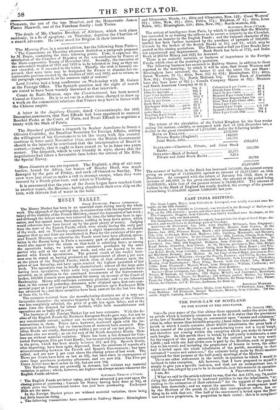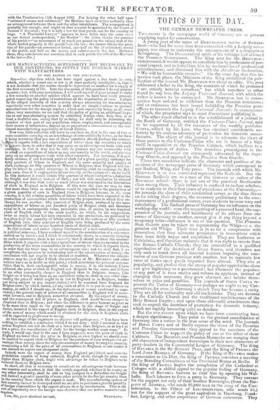THE POOR-LAW OF SCOTLAND. TO THE EDITOR OF THE SPECTATOR.
4th January 1893.
SIR—In your paper of the 31st ultimo there appeared, under the above title, an article which is certainly erroneous in so far as it states that the provisions of the law of Scotland for laying an assessment upon "means and substance," (that is, other means than heritableproperty,) have fallen into desuetude. The parish in which I reside contains about 20,000 inhabitants, the great bulk of whom consist of the population of a manufacturing town not a royal burgh, and therefore not coming within the exception which you make in favour of such burghs. In this parish there is levied, by half-yearly instalments, a sum for the support of the poor, amounting for the current year to very nearly 1,8001.; and while one half of this sum is paid by the Beritors, each in propor- tion to his rental, and including the proprietors of houses in town, the other half is levied upon the whole inhabitants of the parish, according to their estimated "means and substance," the estimate being made by Stent-masters appointed for that purpose at the half-yearly meetings of the limiters. There are other statements in the article in question to which 1 would be inclined to take exception. All, however, that I have proposed to myself is simply to give you a specific instance, and that not an unimportant one, n which the law, alleged by you to be in desuetude, is at this moment in operation.
I am, &c. A PROVINCIAL LAWYER.
[What we said in the article referred to was, that the Act 1579, cap. 74, autho- rizing the Justices of Peace in landward parishes to tax the inhabitants, "ac- cording to the estimation of their substance" for the support of the poor, had fallen into desnetude; and we repeat the assertion. The arrangement made by the Reritors of the parish to which this correspondent refers, has nc.r•
n
thing to do with that act. One half of the assessment is levied upon the Be- tors and town proprietors, in proportion to their rental : this is in compliance
with the Proclamation 11th August 1692. For levying the other half upon "estimated means and substance," the Heritors have no better authority than an arrangement between them and the other inhabitants. The arrangement is probably fair enough, and might on that account be sustained by the Court of Session if disputed ; but it is only a law for that parish, not for the country at large. "A Provincial Lawyer" appears to have fallen into the same error as our former correspondent, "An Heritor" : the latter thinks the practice of his parish—" an assessment of so much per pound on the valued rent of the whole landed property in the parish"—is the law; the former thinks the prac- tice of his parish—an assessment levied, one-half on the (? estimated) rental of the parish, and half on the means and substance—is the law. Between them, they corroborate our assertion that in each parish the will of the Heritors is the law.—En.]



























 Previous page
Previous page